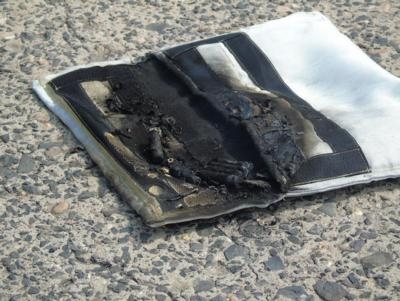Testing Conducted In Conjunction With Germanwings
Morgan Advanced Materials has introduced to the aviation market a novel means of tackling the risk posed by overheating lithium-ion batteries, following an extensive period of testing in conjunction with Germanwings, part of the Lufthansa Group.

The FireMaster battery bag, which measures 500mm x 500mm (approx. 20 x 20 inches), comprises two of Morgan’s specialist thermal materials to create a sealable, water-resistant compartment capable of containing the heat spread in the event of a primary-lithium or lithium-ion battery fire.
Lithium batteries are used in many every-day electronic devices, such as mobile phones, tablet computers and MP3 players. While they are considered a safe and effective form of power storage for portable technology, there have been a number of alarming instances of overheating, with the potential for ‘thermal runaway’. This has raised questions over their safety within an aircraft environment and driven an increase in regulation in this area.
The term ‘thermal runaway’ is used when a lithium battery overheats past its point of thermal stability (150°C/302°F), resulting in fire, explosion, a pressure wave, or all three.
Thomas Schwarz, Sales Director for Morgan Advanced Materials’ Thermal Ceramics business, explains: “The transportation of lithium-based batteries as cargo has been regulated by the aviation authorities for more than a decade, but no limitations have been placed on the transportation of these products within the main aircraft cabin.
“Thermal runaway, although a rare occurrence, can have a catastrophic effect on an aircraft in flight and passenger airlines have been proactive in trying to find a solution to this manageable danger. Now, thanks to the help of Germanwings, we have been able to leverage our expertise in the field of thermal technologies to create a solution to this problem.”
At its core, the bag benefits from Morgan’s FireMaster Marine Plus technology, which was originally designed for use in the Oil & Gas sector. Providing thermal protection from uncontrolled fire for sustained periods of time, Morgan’s FireMaster material is now making its debut in the aviation market in the fight against thermal runaway. The outer layer of the bag comprises a silicone-coated glass cloth and hook-and-loop tape fastener, which secures the bag once the contents have been placed inside.
Maintaining their integrity even when they come into contact with water, which can be applied immediately to help cool the overheated battery, the materials are bound with a high-temperature yarn, typically used in heat protection clothing and welding equipment.
The bag, which is large enough to protect a number of portable devices at once, has been hailed a safe and reliable solution which delivers tried and tested performance at a competitive price.
The FAA has recorded an average of six incidents every year for the last 25 years involving batteries carried as baggage or cargo, with an increasing proportion of these being caused by lithium batteries. Studies have proven that lithium battery fires cannot be adequately suppressed by halon fire extinguishing methods, leading to both primary lithium and lithium-ion batteries being categorized as Class 9 hazardous materials.
Both the FAA and the International Civil Aviation Organization (ICAO) have restricted the transportation of lithium-based batteries as cargo, with the most recent ruling taking effect from the 1st April 2016. Now, thanks to Morgan’s expertise in materials technology, passenger airlines can further eliminate the threat of thermal runaway caused by such batteries in the main cabin space.
(Images provided with Morgan Advanced Materials news release)
 ANN's Daily Aero-Term (04.20.24): Light Gun
ANN's Daily Aero-Term (04.20.24): Light Gun Aero-News: Quote of the Day (04.20.24)
Aero-News: Quote of the Day (04.20.24) ANN's Daily Aero-Linx (04.21.24)
ANN's Daily Aero-Linx (04.21.24) Aero-News: Quote of the Day (04.21.24)
Aero-News: Quote of the Day (04.21.24) ANN's Daily Aero-Term (04.21.24): Aircraft Conflict
ANN's Daily Aero-Term (04.21.24): Aircraft Conflict



